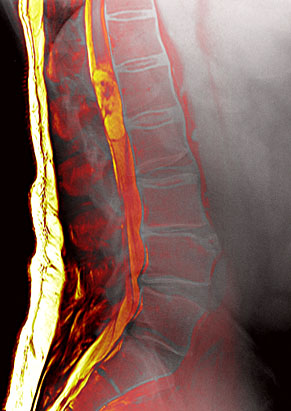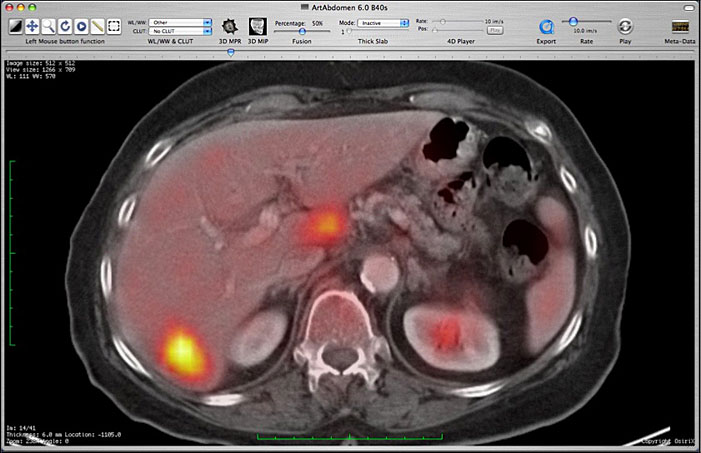Online OsiriX Documentation/Making fusion images
OsiriX has limited support for image fusion. Images obtained during the same imaging session will be automatically aligned by OsiriX. If the two image series have the same number of slices and the same slice spacing, then stack synchronization (under the 2D Viewer menu) can be useful in linking the two series.

Fusion image between axial STIR and T1 images of a football player with a hamstring hematoma. These images were performed during the same imaging exam and were automatically aligned by OsiriX.
There is currently no way to automatically align images obtained on different machines or on the same machine at different times. However, one can manually align such image series to create fusion images, using the Osirix "Move" ![]() and zoom
and zoom ![]() tools. When fusing two images from series with different numbers of slices, it is necessary to first turn off stack synchronization (under the 2D Viewer meu).
tools. When fusing two images from series with different numbers of slices, it is necessary to first turn off stack synchronization (under the 2D Viewer meu).

Image fusion of plain radiograph and T2W MR image of lumbar spine in a patient with an ependymoma centered at L1 and a limbus vertebra at L4. These images were registered manually using the OsiriX Zoom and Move tools.
To create a fusion between any two image series, simply open the two series you want to mix and then “drag-and-drop” the window icon from one on the other:

The window icon is located at the left of the window name.
When initiating the drag of the window icon for fusion, you have to click on the icon and then wait a second or so before starting the drag. Otherwise the entire window will be dragged.

Image fusion between a CT and PET series.
You can control the fusion intensity with the “Fusion Percentage” slider from the toolbar. Note that if you close one of the two series, the fusion will be stopped. If you make a modification on the first series (CLUT, zoom, rotation, ...), these modifications will be applied to the second one.
Image fusion is also available for 2D and 3D reconstructions implying that you can use image fusion along with MPR, Volume rendering, etc...

Image fusion in the 3D MPR window

Image fusion in the 3D MIP window
